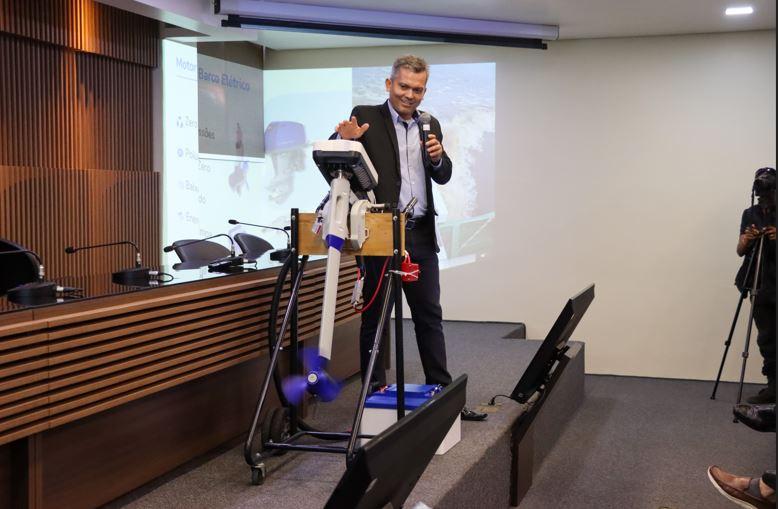2025/07/25
During the "Raízes do Investimento" event, held on the morning of July 8, Livoltek Power do Brasil, BYD Indústria de Baterias Ltda., Granja São Pedro, and Amazônia Pneus highlighted innovative solutions focused on sustainability in the Amazon. Among the initiatives presented were electric outboard motors, photovoltaic batteries, more efficient egg and dairy production practices, and the strengthening of the natural rubber chain.
Livoltek's industrial manager, Márcio Sousa, presented the company's innovation: an electric sterndrive motor, which is expected to begin production at the Manaus Industrial Park (PIM) in 2026. The manager explained that the creation is designed for riverside communities and to reduce river pollution and combustion. Currently, sterndrive motors are powered by gasoline or diesel.

"What I presented today can be put in the canoes of the riverside community. We have a battery capacity of around four hours, and because of our unique characteristics here in the Amazon region, we designed a vertical outboard motor. And because of the low tide, monitoring the river, and the changes, we've already developed a horizontal outboard motor as well," he said.
Sousa emphasized that Livoltek's presence in the Manaus Free Trade Zone (ZFM) is already innovative. "Livoltek produces batteries for our inverters. When you do this, you receive a DC (direct current) load, then convert it to AC (alternating current), and then you need a battery to handle that load. So, with these R$28 billion investments for our chargers, which, by the way, we're just starting our manufacturing process," he said.
The industrial manager stated that the company is in the process of expanding and has planned new projects to be installed . "We are already planning to hire around 93 employees to train, qualify, and also manufacture the chargers. And this presents a unique opportunity."
BYD representative Kleber Costa also emphasized the importance of changing certain standards to create a more sustainable world. Regarding electric vehicle production, he explained that PIM is currently part of a larger process for the company.
"The battery modules are assembled at the ZFM. We receive the finished batteries from China, and here we assemble a set of cells that we call battery modules. Once the battery modules are ready, we send them to our customers—in this case, our specific customer, BYD in Campinas—for attachment to the bus chassis, finishing, and delivery to city governments and our customers who order the vehicles," he explained.
When asked if BYD plans to expand and produce more than just battery modules, Costa said it is one of the company's goals for next year.
"Yes, certainly. We have a new Blade battery project. This battery, as mentioned in the presentation, is the technology used today in electric cars, and BYD currently has buses undergoing approval with the DNIT (National Transportation Authority) and regulatory agencies, bringing this new technology to these electric buses. So, certainly, by 2026, we will have new projects being implemented and applied here in the Free Trade Zone, here in the Amazon region," he stated.
Within the livestock sector, Granja São Pedro introduced more environmentally sustainable processes and stricter animal care regulations. The company showcased innovation in the production of dairy products such as cheese, milk, and other varieties. CEO Francisco Peixoto emphasized that "the pursuit of quality is one of the most important aspects."
Production Declines
The Tire Industry's project coordinator, Auro Levorin, reported that rubber production in the Amazon has declined in recent years, but that the goal is to return to growth and generate income for the region's extractive families.
"Before the pandemic, the amount of rubber produced in the Free Trade Zone dropped significantly. Last year, we reached less than a third of our previous production. We once produced 1,600 tons back in 2015, benefiting 2,300 families within the Amazon region. Amazônia Pneus' goal is to resume rubber extraction in the Amazon," he said.
Levorin emphasized that, working together with the Federal and State Governments, they are developing projects to ensure that the rubber chain reaches 2,400 tons.
"This (2,400) will be achieved solely with Amazônia Pneus' production, once we reach full production capacity. In this sense, we are able to benefit 4,000 families within the Amazon region. We will purchase all the rubber produced and guarantee these families a decent income, thus helping to keep the forest standing."
More Projects
According to data from Sedecti, based on statistics from the Amazonas Development Council (Codam), 565 new companies were established in the Manaus Industrial Hub between 2019 and June 2025, creating 23,224 new jobs and totaling R$12.8 billion in investment.
In 2024 alone, the sectors that received the most contributions were: Electronics (R$2.99 billion), Thermoplastics (R$1.97 billion), Chemicals (R$1.33 billion) and Two Wheels (R$1.20 billion), according to partial data from the PIM Performance Indicators.
Executive Secretary Gustavo Igrejas highlighted that this event is an opportunity to present, in a didactic way, what has been approved in the meetings of the Amazonas State Development Council (Codam).
"We notice a certain lack of awareness in our own society about what's being done in the Manaus Free Trade Zone. So, the goal of this event is to showcase these figures, not only showing what's produced here, but how it's produced. We have a lot of added value in the Manaus Industrial Hub, and this needs to be made public," he emphasized.
Igrejas also stated that the Tax Reform brought more security to new investments and that it is bringing growth to some sectors.
"So far, I haven't seen any negative impact from the Tax Reform that would impede significant investment here. Quite the opposite. Some segments, such as IT and plastics, may become much more attractive to manufacture here in the next five or six years than in other regions of the country."
Copyright © 2023 HEXING GROUP All rights reserved.